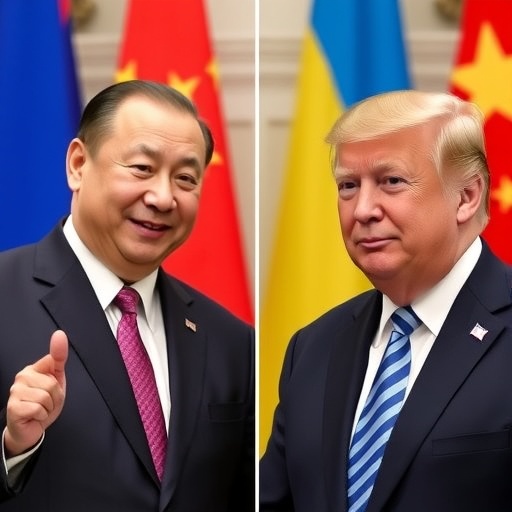Trump Urges China to Broker Russia-Ukraine Peace Deal Ahead of Xi Jinping Summit in South Korea
In a surprising diplomatic pivot, President Donald Trump has publicly called on China to play a pivotal role in brokering a peace deal between Russia and Ukraine, just days before his high-stakes meeting with Chinese President Xi Jinping in South Korea. This announcement, made during a press briefing at the White House, underscores Trump‘s aggressive approach to resolving the ongoing conflict that has gripped global attention since Russia’s full-scale invasion in February 2022.
- Trump’s Strategic Push for Chinese Involvement in Ukraine Talks
- China’s Balancing Act Between Russia Ties and Global Diplomacy
- Reactions from Russia and Ukraine to Trump’s China Proposal
- Historical Precedents and Lessons for US-China Mediation Efforts
- Prospects for a Breakthrough and Global Implications
Trump’s overture comes at a critical juncture, as the war in Ukraine enters its third year, with devastating humanitarian impacts and economic ripples felt worldwide. Over 10,000 civilians have been killed, according to United Nations estimates, and millions displaced, while energy prices and food supplies remain volatile. By enlisting China’s influence, Trump aims to leverage Beijing’s close ties with Moscow to facilitate negotiations, potentially breaking the deadlock that has stalled previous peace efforts.
“China has the power and the relationship with Russia to help end this senseless war,” Trump stated emphatically. “We’re talking about a peace deal that benefits everyone—Russia, Ukraine, and the world. I look forward to discussing this directly with President Xi.” This move highlights Trump’s unorthodox foreign policy style, blending bold rhetoric with pragmatic alliances.
Trump’s Strategic Push for Chinese Involvement in Ukraine Talks
President Trump’s decision to involve China in the Russia-Ukraine peace deal represents a calculated shift in U.S. strategy. Historically, Washington has viewed Beijing with suspicion, especially regarding its economic and military support for Russia. However, Trump argued that China’s economic leverage—evidenced by its $190 billion trade surplus with the U.S. in 2023 and its role as Russia’s largest trading partner—could pressure Moscow into concessions.
During the briefing, Trump referenced recent intelligence reports indicating China’s reluctance to fully endorse Russia’s actions but its continued supply of dual-use technologies. “Xi and I have a great relationship,” Trump added, recalling their past summits. “He respects strength, and I’m bringing that to the table.” This personal diplomacy is central to Trump’s plan, as the upcoming summit in South Korea, hosted by the Asia-Pacific Economic Cooperation (APEC) forum, provides a neutral venue for private discussions.
Experts note that China’s involvement could be transformative. Dr. Elena Vasquez, a senior fellow at the Brookings Institution, commented, “Beijing has mediated in other conflicts, like the Iran nuclear deal indirectly. If Trump can convince Xi, it might lead to a ceasefire framework by mid-2025.” Yet, challenges abound: China’s “no-limits” partnership with Russia, declared in 2022, complicates its neutrality.
The proposal also ties into broader U.S. interests. With Ukraine receiving over $60 billion in U.S. aid since the invasion, Trump seeks to reduce American financial burden while maintaining influence. He proposed a tripartite framework: U.S. mediation on security guarantees, European Union focus on reconstruction, and China handling economic incentives for Russia.
China’s Balancing Act Between Russia Ties and Global Diplomacy
China’s potential role in the Russia-Ukraine peace deal places Beijing in a delicate position. As Russia’s top oil buyer—importing 2.2 million barrels per day in 2023—China benefits from discounted energy amid Western sanctions. However, President Xi Jinping has repeatedly called for peace, abstaining from U.N. votes condemning Russia while avoiding direct military aid.
Trump’s urging aligns with China’s self-proclaimed image as a responsible global power. In a recent speech at the United Nations General Assembly, Xi stated, “China stands ready to promote peace talks and contribute to a political settlement of the Ukrainian crisis.” This rhetoric suggests openness, but analysts caution that Beijing prioritizes its strategic interests, including countering U.S. influence in Asia.
The South Korea summit adds intrigue. Hosted in Busan from November 15-17, 2024, it coincides with heightened tensions over Taiwan and trade tariffs. Trump, who imposed 25% tariffs on Chinese goods during his first term, may use the peace deal as leverage. “If China helps with Ukraine, we can talk trade,” Trump hinted, alluding to potential tariff relief.
Domestic pressures in China also factor in. With its economy growing at 4.6% in 2024—below pre-pandemic levels—Xi faces calls to stabilize global markets disrupted by the war. A successful mediation could boost China’s international stature, positioning it as an alternative to U.S.-led diplomacy. Yet, Russian President Vladimir Putin has dismissed third-party involvement, insisting on direct talks with Kyiv.
From Ukraine’s perspective, enlisting China raises eyebrows. President Volodymyr Zelenskyy, who has accused Beijing of enabling Russian aggression through component supplies, responded cautiously: “We welcome any genuine effort for peace, but trust must be earned.” This underscores the geopolitical tightrope Trump is navigating.
Reactions from Russia and Ukraine to Trump’s China Proposal
The international community has reacted swiftly to Trump’s call for China to broker the Russia-Ukraine peace deal. In Moscow, Kremlin spokesperson Dmitry Peskov expressed skepticism, stating, “Russia appreciates initiatives for dialogue, but any peace deal must respect our security concerns.” This veiled reference to NATO expansion highlights Russia’s core demands, including Ukraine’s neutrality and territorial concessions in Donbas and Crimea.
Russia’s economy, strained by sanctions yet buoyed by $300 billion in frozen assets, relies heavily on China. Trade between the two nations surged 26% to $240 billion in 2023, making Beijing an indispensable partner. Putin, who met Xi in May 2024, may view Trump’s proposal as an opportunity to extract concessions without appearing weak.
In Kyiv, the response was more guarded. Ukrainian Foreign Minister Dmytro Kuleba emphasized, “Peace cannot come at the cost of our sovereignty. China’s involvement must align with the Budapest Memorandum principles.” Signed in 1994, this agreement saw Ukraine relinquish nuclear weapons in exchange for security assurances from Russia, the U.S., and others—assurances Russia violated in 2014 and 2022.
European allies, including NATO members, have mixed views. German Chancellor Olaf Scholz praised the initiative as “innovative,” while French President Emmanuel Macron warned against sidelining Europe. The U.K., a staunch Ukraine supporter with £12 billion in aid, stressed the need for robust security guarantees. U.S. domestic reactions are polarized: Republicans hail Trump’s deal-making prowess, while Democrats question China’s impartiality.
Statistics paint a grim picture of the conflict’s toll. The World Bank estimates Ukraine’s reconstruction costs at $486 billion over the next decade, with agricultural exports—vital for global food security—down 30%. Trump’s proposal could accelerate aid flows if a deal materializes, potentially unlocking frozen Russian assets for reparations.
Historical Precedents and Lessons for US-China Mediation Efforts
Trump’s bid to involve China in the Russia-Ukraine peace deal draws on historical precedents of great-power mediation. During the Cold War, China brokered the 1972 Shanghai Communiqué with the U.S., easing Sino-American tensions. More recently, in 2023, Beijing facilitated a Saudi-Iran détente, showcasing its diplomatic clout in the Middle East.
These examples inform Trump’s strategy. Unlike the failed Minsk Agreements of 2014-2015, which ignored broader geopolitical stakes, Trump’s approach incorporates economic incentives. He envisions a “grand bargain” where China gains U.S. market access in exchange for pressuring Russia to withdraw from occupied territories.
Context from Trump’s first term adds depth. In 2018, he tasked China with North Korea talks, yielding the Singapore Summit. Similarly, here, personal rapport with Xi—forged over golf outings and state dinners—could prove decisive. However, past U.S.-China frictions, including the 2019 trade war that cost $316 billion in global GDP, remind of pitfalls.
The Ukraine conflict’s roots trace to 2014’s Maidan Revolution, when pro-EU protests ousted a pro-Russian president, prompting Crimea’s annexation. Since then, over 14,000 deaths preceded the 2022 escalation. Trump’s plan addresses these by proposing a demilitarized zone monitored by U.N. peacekeepers, with China contributing logistics.
Scholars like Professor Li Wei from Peking University argue, “China’s non-interference principle limits deep involvement, but economic pragmatism may prevail.” This tension will test the summit’s outcomes.
Prospects for a Breakthrough and Global Implications
Looking ahead, Trump’s push for a China-brokered Russia-Ukraine peace deal could reshape international relations. If successful, it might end the war by early 2025, freeing up $100 billion annually in global military spending for development. Energy markets could stabilize, with Brent crude prices potentially dropping 20% from current $80 per barrel levels.
Next steps include bilateral talks in South Korea, followed by a potential quadrilateral summit involving Trump, Xi, Putin, and Zelenskyy. U.S. diplomats are preparing proposals for territorial compromises, such as autonomy for Russian-speaking regions without formal secession.
Failure, however, risks escalation. With Russia advancing in Donetsk and Ukraine’s counteroffensives stalling, prolonged conflict could draw in NATO directly. Trump’s initiative, bold as it is, underscores his belief in deal-making as diplomacy’s cornerstone.
Stakeholders worldwide watch closely. For the U.S., success bolsters Trump’s 2024 re-election narrative; for China, it elevates Xi’s global leadership. Ultimately, a peace deal hinges on mutual concessions, with Trump’s China outreach offering a glimmer of hope amid uncertainty.








